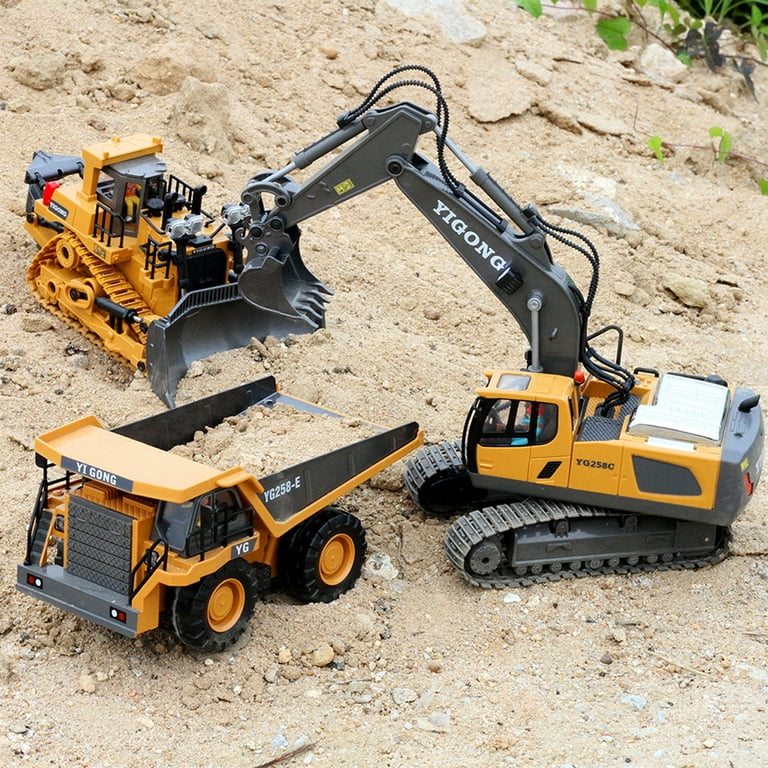Discover the Significance of Excavator in Modern Building Projects
Excavators are crucial tools in modern building and construction jobs. Their flexibility enables them to execute a vast range of tasks, from digging and grading to demolition and website preparation. Advanced features, such as hydraulic add-ons and general practitioners, boost their capabilities and effectiveness on job websites. As the industry advances, the value of excavators grows much more. Understanding their duty can disclose understandings into the future of building and construction practices. What exists ahead for these devices?
The Convenience of Excavators in Numerous Projects
Although excavators are commonly related to large-scale building and construction projects, their versatility permits them to be made use of in a vast array of applications, from domestic landscape design to energy maintenance. In metropolitan settings, excavators can navigate limited spaces to dig foundations for homes or set up drain systems. Their capability to carry out delicate jobs makes them optimal for landscape design jobs, where they can excavate for fish ponds or plant trees. On top of that, excavators play a vital duty in energy upkeep, efficiently excavating trenches for pipes or wires without disrupting bordering areas. In agricultural applications, they aid in land clearing up and soil prep work. Furthermore, their adaptability allows them to be geared up with various attachments, improving their capability throughout different jobs. This multifaceted nature of excavators not just streamlines different building and construction processes however additionally shows their integral function in modern facilities advancement and maintenance.
Secret Features and Kinds Of Excavators
The conversation on essential features and sorts of excavators highlights the necessary attributes that make these makers vital in building and construction. Various excavator types, each developed for specific tasks, demonstrate their flexibility and efficiency throughout various applications. rc excavator. Recognizing these categories and functions is vital for maximizing their usage in modern building tasks
Excavator Enters Overview
Excavators play an essential function in contemporary building and construction, using versatility and effectiveness across numerous jobs. These hefty machinery units can be found in a number of kinds, each tailored for particular applications. The most typical kinds consist of spider excavators, understood for their stability on unequal surface, and wheeled excavators, which provide greater flexibility on paved surface areas. Small excavators are preferred for small jobs and limited spaces, while long-reach excavators are designed for deep digging. In addition, there are customized excavators, such as hydraulic excavators, which enhance power and accuracy. Each kind includes distinct capabilities, making them essential for tasks ranging from digging and grading to demolition and material handling. Understanding these variations allows construction specialists to pick the right excavator for their task needs.
Secret Includes Explained
Recognizing the vital features of excavators boosts their reliable application in construction tasks. Excavators are characterized by their effective hydraulic systems, which supply the necessary pressure for excavating, training, and moving products. Their verbalized arms allow for a broad variety of movement, assisting in precise procedures in confined rooms. Furthermore, the selection of add-ons, such as buckets, grapples, and augers, expands their versatility to satisfy various task demands. The size and weight of excavators additionally add to their stability and ability to move on different terrains. Advancements in technology have actually led to the integration of General practitioner and automation, enhancing accuracy and performance in excavation jobs. These functions jointly position excavators as crucial tools in modern building and construction.
Applications in Construction
Transforming construction sites, excavators play a critical duty across numerous applications, varying from residential building jobs to large-scale facilities growths. These functional machines are furnished for tasks such as excavating structures, trenching for utilities, and website grading. Different kinds of excavators, including crawler, rolled, and mini excavators, supply particular benefits tailored to the job requirements. Crawler excavators succeed in rough terrains, while wheeled excavators supply mobility on smooth surfaces. Tiny excavators are perfect for restricted rooms, making them popular in urban setups. The performance and power of excavators substantially speed up building processes, guaranteeing timely task conclusion. Their flexibility additionally boosts their importance, enabling construction groups to take on a varied selection of challenges efficiently.
Enhancing Efficiency and Efficiency on Job Sites
Making best use of performance and efficiency on work websites is an essential objective in modern construction. Excavators play a crucial function in accomplishing this objective by enhancing numerous jobs. Their ability to carry out multiple functions-- such as lifting, grading, and excavating-- minimizes the demand for extra equipment, thereby saving time and resources.Moreover, excavators boost operations by enabling for faster completion of jobs. With advanced attributes like hydraulic accessories and GPS technology, they can implement exact operations that lessen mistakes and rework. This precision not only boosts the high quality of job yet additionally optimizes product use, adding to set you back savings.The convenience of excavators enables them to adjust to different website problems, making certain that jobs advance efficiently regardless of challenges. By incorporating excavators right into construction processes, groups can considerably boost their total performance, bring about prompt job conclusion and enhanced earnings.
Safety Benefits of Making Use Of Excavators
Excavators substantially boost safety on building websites with boosted operator exposure and minimized hands-on labor dangers. By providing operators with a clear view of their environments, excavators help to stop crashes and injuries. Additionally, the machinery reduces the requirement for workers to take part in unsafe manual tasks, better promoting a more secure workplace.
Improved Driver Presence
Although building and construction sites can be chaotic and filled up with possible threats, enhanced driver visibility plays an important function in making certain security when making use of excavators. Modern excavators are made pop over here with big, unhampered home windows and tactically placed mirrors, enabling operators to keep a clear sight of their surroundings (rc excavator). This enhanced presence is vital for finding pedestrians, other machinery, and different obstacles, substantially reducing the threat of accidents. Additionally, lots of excavators include sophisticated innovation, such as sensing units and cameras, to offer drivers with additional viewpoints, even more enhancing recognition. The capability to see more clearly not only help in efficient procedure yet additionally cultivates a much safer workplace, making it easier for drivers to navigate intricate building sites without endangering safety and security criteria
Minimized Manual Work Dangers
When manual work is reduced with using excavators, countless security advantages arise, noticeably improving the health of building and construction workers. Excavators lessen the physical pressure connected with hefty training and recurring jobs, successfully decreasing the threat of musculoskeletal injuries. By automating processes such as excavating, grading, and relocating products, they allow workers to preserve a more secure range from prospective threats. Furthermore, excavators are outfitted with innovative safety and security features, such as rollover protection systems and enhanced operator ergonomics, which additionally guard employees on website. The result is a considerable decrease in work you can find out more environment accidents and injuries, causing raised performance and spirits among construction teams. Inevitably, the adoption of excavators contributes to a more secure and extra efficient building environment.
Excavators in Earthmoving and Website Prep Work
In modern building, a considerable part of earthmoving and website prep work tasks depends on the effectiveness and adaptability of excavators. These devices are made to deal with various dirt types and surface, making them indispensable for rating, excavating, and trenching activities. Their hydraulic arms can check out here be equipped with various add-ons, such as containers and augers, enabling drivers to personalize their method based upon particular task requirements.Excavators succeed at moving large quantities of planet promptly and effectively, which accelerates the general construction timeline. They can browse limited spaces and testing websites where conventional tools might struggle, boosting performance. Furthermore, the accuracy of excavators guarantees that website preparation sticks to stringent specifications, decreasing the threat of errors that could cause costly rework.
The Duty of Excavators in Demolition Tasks
Excavators play a crucial function in demolition jobs, as they possess the power and dexterity required to take down frameworks efficiently. Furnished with numerous attachments such as hydraulic breakers, shears, and grapples, these machines can adjust to various demolition requirements, whether for little structures or large industrial websites. Their flexibility allows drivers to take on complex projects while preserving safety and security and precision.In addition to their demolition capacities, excavators help with particles elimination, ensuring that work sites remain risk-free and orderly. By damaging down frameworks into convenient pieces, they enable structured clearing and recycling of products, straightening with contemporary sustainability efforts.Moreover, excavators can access limited rooms and browse unequal surface, making them essential in urban demolition jobs. On the whole, their durable layout and multifunctionality make excavators a vital property in the demolition stage of building and construction, contributing substantially to task timelines and effectiveness.


Future Patterns in Excavator Technology and Usage
As the building and construction market evolves, innovations in excavator innovation are positioned to change their use and performance noticeably. One considerable pattern is the combination of automation and artificial knowledge, enabling excavators to run with minimal human treatment. This shift will boost accuracy in jobs such as grading and trenching, lowering human error and increasing productivity.Additionally, the surge of electric and hybrid excavators is shaping an extra lasting construction setting, decreasing carbon exhausts and fuel expenses. Boosted telematics systems are also emerging, making it possible for real-time tracking of machine performance and maintenance demands, which can cause far better functional efficiency and longer tools lifespan.Moreover, improvements in accessory technology are broadening the flexibility of excavators, allowing them to do a more comprehensive series of tasks. The combination of these trends shows a future where excavators are smarter, greener, and extra versatile, ultimately reshaping building and construction project characteristics.
Often Asked Inquiries
Exactly How Do Excavators Compare to Other Construction Equipment?
Excavators, characterized by their flexibility and power, succeed in excavating and earthmoving contrasted to various other machinery. Their ability to do different jobs, consisting of lifting and demolition, makes them indispensable in building jobs, enhancing general effectiveness.

What Is the Average Life-span of an Excavator?
The average life-span of an excavator normally varies from 7,000 to 10,000 operating hours, relying on upkeep, usage problems, and version. Correct care can extend this lifespan, ensuring peak efficiency throughout its operational years.
Exactly How Are Excavators Kept for Optimum Performance?
Excavators require normal upkeep for peak performance, including routine inspections, fluid checks, filter replacements, and timely repair services. Applying a preventative upkeep routine aids extend their lifespan and warranties effective procedure in different construction environments.
What Are the Costs Associated With Buying an excavator vs. renting?
The expenses connected with getting an excavator versus leasing vary substantially. Leasing deals reduced upfront expenditures but can collect over time, while buying requires a significant initial investment, yet offers long-term financial savings and asset ownership advantages.
What Training Is Required to Operate an Excavator?
Operating an excavator calls for specialized training, generally consisting of safety procedures, device operation strategies, and ecological awareness. Accreditation programs frequently mandate practical experience, making it possible for operators to deal with various jobs efficiently while making certain compliance with industry guidelines. The most typical kinds include spider excavators, understood for their security on uneven surface, and rolled excavators, which provide better movement on smooth surface areas. Mini excavators are favored for limited areas and small-scale tasks, while long-reach excavators are created for deep excavating. Furthermore, there are specific excavators, such as hydraulic excavators, which improve power and precision. Various types of excavators, consisting of spider, wheeled, and mini excavators, offer details benefits tailored to the job needs. Spider excavators stand out in harsh surfaces, while rolled excavators supply wheelchair on smooth surface areas.